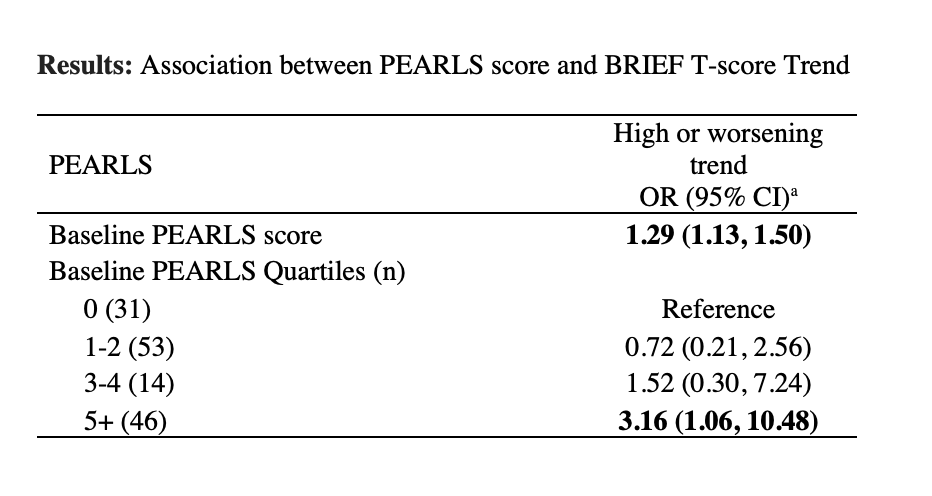Developmental and Behavioral Pediatrics
Session: Developmental and Behavioral Pediatrics 3: Screening
414 - Pediatric adverse childhood experiences and related life events screener (PEARLS) associated with future executive function in a pediatric population
Friday, May 3, 2024
5:15 PM - 7:15 PM ET
Poster Number: 414
Publication Number: 414.139
Publication Number: 414.139

Erika Cagampan, MD (she/her/hers)
Resident Physician
Children's Hospital Los Angeles
Los Angeles, California, United States
Presenting Author(s)
Background: The Pediatric adverse childhood experiences and related life events screener (PEARLS) tool is a validated primary care screener for Adverse Childhood Experiences (ACEs) and Related Life Events experienced by youth 21 and under. Numerous studies report that ACEs are associated with adverse health outcomes—such as asthma, obesity, and substance use disorder—and are good predictors of mean group differences in health outcomes, but whether they are associated with short-term health outcomes in individuals remains unclear.
Objective: To evaluate the association between a child’s baseline PEARLS score and their measure of executive function after 9 months of follow-up.
Design/Methods: Participants (0-11 years old) were enrolled in the Pediatric ACEs Screening and Resiliency Study at the University of California San Francisco (UCSF) Benioff Children’s Hospital Oakland Primary Care Clinic, a Federally Qualified Health Center, between March 2017-October 2018. Caregivers completed the PEARLS and the Behavior Rating Inventory of Executive Function (BRIEF)-Preschool (P)/2 questionnaire at baseline and 9-month follow-up visits. The primary predictor variable was baseline PEARLS score, analyzed as a continuous variable and as score quartiles: 0, 1-2, 3-4, 5+. Executive function was assessed with the BRIEF-P/2 T-score as both a continuous variable and dichotomized according to clinical significance (T-score >65). Multivariable linear and logistic regression models were adjusted for child age, gender, race, and caregiver education.
Results: 144 participants had values at baseline and follow-up, median age at baseline was 6.9, 40.3% female, and 59.7% identified as Black. The baseline mean PEARLS score was 3.5. A PEARLS score of 5+ was significantly associated with higher baseline BRIEF-T scores (Mean 68.16, SD 7.95; p = 0.002) compared to those who have 0 PEARLS at baseline (Mean 57, SD 7.95). The odds of persistently high or worsening executive function at 9 months were higher in those with 5+ PEARLS than those who reporting 0 PEARLS at baseline (OR: 3.16; 95% CI: 1.06, 10.48; p = 0.04). Each unit increase in baseline PEARLS was also associated with increased odds of persistently high or worsening BRIEF-T score (OR: 1.29; 95% CI: 1.13, 1.50; p = 0.0002).
Conclusion(s): The PEARLS tool can be used to predict poor or worsening executive function in patients ages 21 and under in a pediatric primary care setting, with a PEARLS score 5+ demonstrating a significant association with poor or worsening child executive function after 9 months of follow-up.

